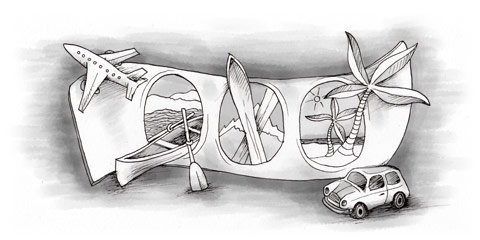If you are from EU country, you can keep using your national driving license. Foreigners from non-EU countries must carry an International driver's license.
Driver's requirements
Requirements the drivers must comply with:
- You must be at least 18 years old.
- Seat belt are compulsory for everyone in the car.
- Headlights must be on during the whole year.
- Child seat is obligatory if your kid weighs less than 36 kg, or is smaller than 1.5 metres.
- You are not allowed to use your phone while driving unless you fit it with a hands-free advice.
Documents and permits
While driving, you should always carry with you:
- driving license
- passport
- car registration papers
- car insurance documents
- certificate of the technical condition of your vehicle
Road tolls in Czech Republic are only on highways. You must buy a road-usage tax sticker with a highway symbol on it. They sell them at gas stations, post offices or border crossings. You must place the sticker on your windscreen from the inside, in the lower right hand corner. This highway sticker is available for a weekly, monthly or annual time period. Failure to display the sticker is fined on the spot. The sticker has a second part which you fill in with your car registration number and save it for any future police check-up.
Equipment
The obligatory equipment of all private cars in Czech Republic are these following items:
- first aid kit
- reflective warning triangle
- reflective high visibility jacket
- spare bulbs for the car's external lights
You may also need winter tyres or snow chains for driving during the winter period.
Road conditions
First-class roads in the Czech Republic meet European standards. Beside the highways, there are many similar quality high-speed roads which connect major Czech towns. The roads are well marked and with many gas stations alongside. Rural roads are usually uneven and poorly marked.
Fuel
Gas stations are generally located on the town outskirts. They are usually open 24 hours and accept credit cards. They provide leaded and unleaded gasoline and diesel fuel.

